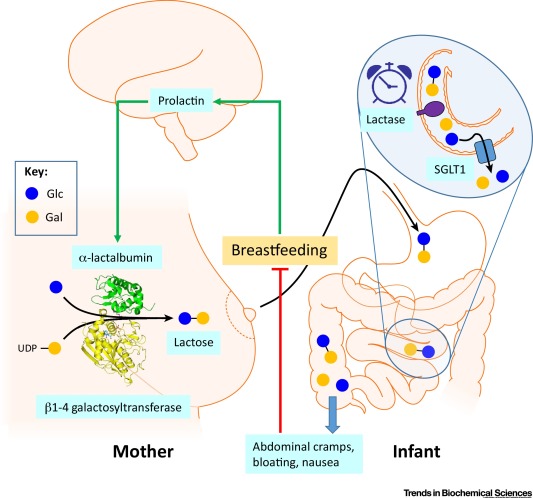Whether carbohydrates is good or bad is indeed a hot topic nowadays. One thing is certain though and that is that human breast milk is packed with sugars.
Human breast milk contains more sugar than, for example, cow’s milk. The sugar is thought to affect our children’s early development.
Sugar is Key
We humans may have the most complex breast milk of all mammals. Human breast milk contains more than 200 different types of sugars, while the average for other animals like cows and mice is 30 to 50. Exactly what all these different sugar molecules are needed for is yet to be established. But a new study provides clues to why we need more sugar than the rest of the animal kingdom. The researchers believe that the carbohydrates build up the immune system and help develop the body’s bacterial flora.
Since milk is rich in antibodies and molecules that slow down the growth of bacteria that can otherwise harm us, this is indeed particularly important shortly after birth. The theory is that human breast milk thus helps to build the foundation for the child’s immune system.
Carbohydrates Binds Bacteria
We know that bacteria that can cause diseases have a tendency to bind to carbohydrates. The researchers in this new study were able to see that harmful bacteria in the gut was bound to the milk carbohydrates instead of being absorbed into the body.
When babies are born they have no bacteria in the stomach at all, but within a few days, they have millions and after a few weeks, they are up in the billions. The sugar from the breast milk is usually the first food that these bacteria have to eat, and it is a meal that is meant to favor specific bacterial cultures.
But compared to when a calf is born, it has an almost fully developed immune system and is almost ready to go. A human takes much longer to develop and a child’s immune system is not fully developed until about five years of age.
Milk Through the Nose
Most children get milk through the nose and it may be a protection mechanism for children. Behind the throat and up to the nose there are many bacteria and some of these can cause ear infections. Getting the carbohydrate-rich milk up through the nasal passage is therefore thought to prevent some these diseases as the bacteria attach themselves to the sugars in the milk instead. This hypothesis is supported by the fact that children who breastfeed are less prone to be afflicted by these diseases.
Health Effects of Breastfeeding
Despite the many functions of breast milk, children can grow up healthy with limited or even without human breast milk, which raises controversial questions about what is normal when it comes to breastfeeding. Breast milk does clearly reduce infant mortality and significantly decreases a newborn’s risk for gut and airway infections, but there’s little support for longer-term benefits.
“We have to be careful about giving any recommendations,” says Theiry Hennet, who co-wrote the study with Lubor Borsig, both physiologists at the University of Zurich. “On the one hand, breast milk is the product of millions of years of evolution and certainly possesses the optimal nutrients for a newborn, but the question is how long does the newborn really need this supply? We feel families should make that decision, and not scientists.”
____________
Breastfed at Tiffany’s
________________________
























